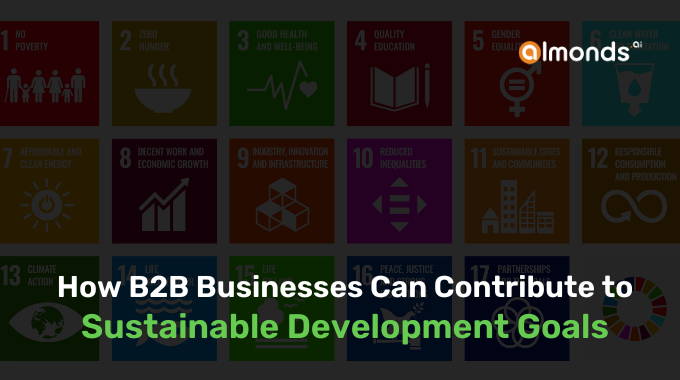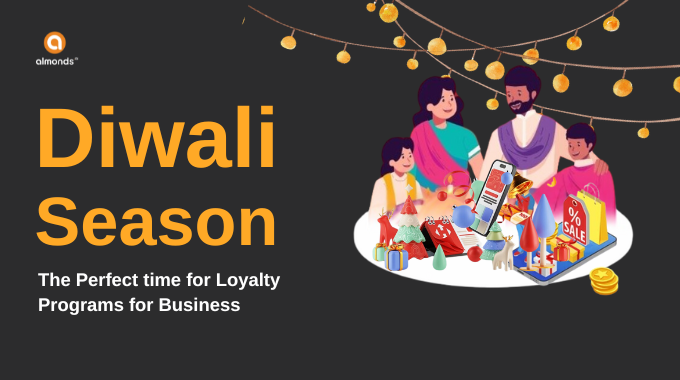Sustainable Development Goals (SDGs) stand as a beacon of hope, offering a roadmap to a more sustainable and equitable world by 2030. These are the combination of 17 global goals and 169 targets, which aim to tackle pressing issues such as poverty, environmental protection, and peace. But did you know that businesses operating in the B2B space have a significant role in achieving these goals?
In this blog, we’ll explore how B2B businesses can align their strategies, operations, and practices with the SDGs while positively impacting society and their bottom line.
What are SDGs
The SDGs, as defined by the United Nations, encompass a wide range of critical issues affecting our planet and its inhabitants. These goals provide a comprehensive framework for addressing global challenges.
Goal 1: No poverty
Goal 2: Zero hunger (No hunger)
Goal 3: Good health and well-being
Goal 4: Quality education
Goal 5: Gender equality
Goal 6: Clean water and sanitation
Goal 7: Affordable and clean energy
Goal 8: Decent work and economic growth
Goal 9: Industry, Innovation and Infrastructure
Goal 10: Reduced inequality
Goal 11: Sustainable cities and communities
Goal 12: Responsible consumption and production
Goal 13: Climate action
Goal 14: Life below water
Goal 15: Life on land
Goal 16: Peace, justice, and strong institutions
Goal 17: Partnership for the goals
Even though we all want to achieve all these goals, not all companies can achieve every goal on the list. Different business sectors can achieve different goals. Now, let’s delve into some key SDGs and see how B2B companies can contribute to their achievement.
Goal 2: Zero Hunger
B2B businesses can play a pivotal role in addressing hunger by promoting responsible practices in the food industry. Here’s how:
- Reducing Food Waste: Implement efficient supply chain management to reduce food wastage, ensuring food reaches those in need instead of ending up in landfills.
- Sustainable Agriculture: Support sustainable farming practices that enhance crop yields while minimizing the environmental impact.
- Fair Trade: Encourage fair trade practices, ensuring farmers and workers receive fair compensation for their labor and products.
Goal 7: Affordable and Clean Energy
Affordable and clean energy is essential for sustainable development. B2B businesses can contribute by:
- Investing in Renewable Energy: Explore opportunities to invest in renewable energy sources such as solar, wind, and hydroelectric power.
- Energy Efficiency: Enhance energy efficiency within your operations to reduce energy consumption and associated costs.
- Reducing Emissions: Implement measures to decrease greenhouse gas emissions, creating a cleaner environment.
Goal 8: Decent Work and Economic Growth
Creating decent jobs and fostering economic growth are crucial components of the SDGs. B2B businesses can contribute by:
- Job Creation: Expand your workforce by creating quality jobs with fair wages and benefits.
- Supporting Entrepreneurship: Collaborate with startups and small businesses to promote entrepreneurship and innovation.
- Respecting Labor Rights: Ensure your business respects labor rights and provides a safe and inclusive working environment.
Goal 9: Industry, Innovation and Infrastructure
Large and small companies can play a pivotal role in achieving this SDG by collaborating with governments, communities, and other stakeholders.
- Investment in Infrastructure Development: It aims to create new technologies, products, and services that address pressing societal challenges.
- Green Technology Adoption: It includes energy-efficient manufacturing processes, renewable energy sources, and sustainable waste management practices.
- Sustainable Manufacturing Practices: Companies can adopt sustainable manufacturing practices prioritizing resource efficiency, waste reduction, and environmental protection. Sustainable manufacturing reduces environmental harm and enhances cost-efficiency and product quality.
Goal 12: Responsible Consumption and Production
Responsible consumption and production are at the heart of sustainable development. B2B businesses can make a difference by:
- Circular Economy: Adopt circular economy models, promoting product reuse, recycling, and reducing waste.
- Resource Efficiency: Optimize resource use, reduce environmental impacts, and conserve natural resources.
- Sustainable Procurement: Implement sustainable procurement practices, sourcing products and materials ethically.
Goal 17: Partnerships for the Goals
Partnerships are key to achieving the SDGs. B2B businesses can collaborate with various stakeholders to amplify their impact:
- Collaboration: Partner with governments, civil society organizations, academia, and consumers to advance common goals and values.
- Shared Values: Identify shared values and objectives to build strong partnerships that drive sustainable change.
- Collective Action: Take collective action with your partners to address global challenges more effectively.
Taking Action: Practices for B2B Businesses
Let’s delve into some specific practices they can adopt to align with these goals:
- Sustainability Assessments: Conduct regular sustainability assessments to identify areas where your business can significantly impact the SDGs.
- Goal Integration: Integrate specific SDGs into your corporate strategy and goals, ensuring alignment with your mission and values.
- Supply Chain Responsibility: Implement responsible supply chain practices, ensuring your suppliers adhere to ethical and sustainable standards.
- Employee Engagement: Engage your employees in sustainability efforts, fostering a sense of purpose and responsibility within your workforce.
- Transparency: Be transparent about your sustainability initiatives, sharing progress and outcomes with stakeholders and the public.
Organizations Leading the Way
Several organizations are actively working to advance the SDGs, and B2B businesses can draw inspiration from their efforts:
1. Huawei
Focus Areas: Digital technology, reducing digital inequality, education, health, and environmental protection.
How: Huawei leverages digital technology to bridge the digital divide, providing access to education and healthcare while promoting e-waste recycling to achieve environmental sustainability.
2. Nike
Focus Areas: Gender equality, climate action, circular economy.
How: Nike champions gender equality by promoting females in their work environment. They use eco-friendly products in manufacturing and advertise them to encourage climate consumer awareness. Nike has also taken circular economy initiatives within the global sportswear industry.
3. LEGO
Focus Areas: Quality education, innovation, and creativity for children.
How: LEGO’s commitment to quality education, innovation, and fostering creativity among children. It has taken the initiative to never manufacture products from 1st use plastic.
4. JetBlue
Focus Areas: Reducing carbon footprint, renewable energy, and social causes.
How: JetBlue actively reduces its carbon footprint, invests in renewable energy, and supports various social causes by constantly improving its engines’ efficiency and using eco-friendly products.
5. Discovery Channel
Focus Areas: Raising awareness, and educating people about SDGs through content.
How: The Discovery Channel plays a vital role in raising awareness and educating viewers about the SDGs through its engaging TV series and documentary.
6. Hilton Hotels
Focus Areas: Reducing water consumption, waste generation, and carbon emissions.
How: Hilton Hotels has significantly reduced water consumption, waste generation, and carbon emissions within the hospitality sector through recycling and educating their customers through small cue cards and posters.
7. Infosys
Focus Areas: Aligning business goals with SDGs, supporting education, health, environment, and social justice initiatives.
How: Infosys actively aligns its business goals with the SDGs and contributes to digital education, employees’ health, reduced e-waste to achieve environmental sustainability, and social justice initiatives like gender equality, LGBTQ+ friendly work environment, etc.
8. Tata Steel
Focus Areas: Promoting decent work, economic growth, innovation, responsible consumption, and production.
How: Tata Steel’s initiatives focus on promoting a healthy factory work environment, economic growth among factory workers, fostering innovation in manufacturing machines and factory management, and responsible consumption and production.
9. Mahindra Group
Focus Areas: Carbon neutrality, renewable energy, water conservation, social empowerment.
How: The Mahindra Group has committed to achieving carbon neutrality by increasing the efficiency of the workplace and factories, investing in renewable energy, conserving water resources, and empowering workers’ communities socially.
These are just a few examples of the many companies that are actively contributing to the SDGs. They serve as inspiring models for how B2B businesses can align their strategies and practices with the SDGs to create a better, more sustainable world.
Exploring Further
The journey towards achieving the SDGs is a collective effort, with businesses, governments, civil society, and individuals all playing pivotal roles. Almonds Ai has taken an initiative named “Green Loyalty Program” to make the loyalty programs eco-friendly and sustainable. On the one hand, it will educate more channel partners about sustainability. On the other hand, it will promote small businesses and help them grow.
Join us on this initiative and be a part of a sustainable future building.







